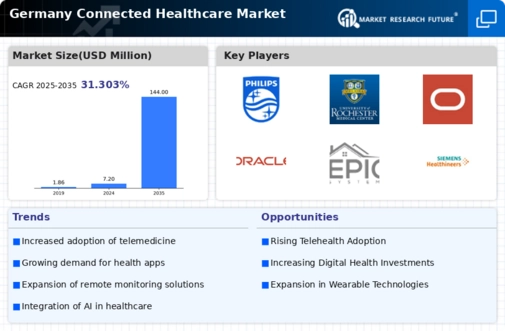Regulatory Support for Digital Health
Germany's connected healthcare market benefits from robust regulatory frameworks promoting digital health solutions. The German government has implemented policies that encourage the integration of technology in healthcare, such as the Digital Healthcare Act. This legislation facilitates the reimbursement of digital health applications, thereby incentivizing healthcare providers to adopt connected solutions. As of 2025, approximately 30% of healthcare providers in Germany have integrated some form of digital health technology into their practices. This regulatory support is crucial for the growth of the connected healthcare market. It fosters innovation and ensures patients have access to modern healthcare solutions.
Rising Demand for Remote Patient Monitoring
The connected healthcare market in Germany is experiencing a surge in demand for remote patient monitoring solutions. With an aging population and a growing prevalence of chronic diseases, healthcare providers are increasingly seeking ways to monitor patients outside traditional clinical settings. As of 2025, it is estimated that around 25% of patients in Germany utilize remote monitoring devices, which allow for continuous health tracking and timely interventions. This trend is likely to drive the expansion of the connected healthcare market. Both patients and providers recognize the benefits of proactive health management and the potential for improved health outcomes.
Consumer Acceptance of Digital Health Solutions
Consumer acceptance of digital health solutions is a significant factor influencing the connected healthcare market in Germany. Surveys indicate that over 60% of German citizens are open to using digital health applications for managing their health. This growing acceptance is driven by increased awareness of the benefits of technology in healthcare, such as convenience and accessibility. As more individuals embrace digital health tools, the connected healthcare market is poised for growth, as providers adapt to meet the evolving expectations of tech-savvy patients. This shift in consumer behavior is likely to shape the future landscape of healthcare delivery.
Increased Investment in Health IT Infrastructure
Investment in health IT infrastructure is a key driver of the connected healthcare market in Germany. The government and private sector are channeling substantial resources into enhancing digital health systems, which is expected to reach €5 billion by 2026. This investment focuses on improving data security, interoperability, and the overall efficiency of healthcare delivery. As healthcare organizations upgrade their IT capabilities, the connected healthcare market is likely to flourish, enabling seamless communication between patients and providers. Enhanced infrastructure not only supports existing technologies but also paves the way for future innovations in digital health.
Collaboration Between Tech Companies and Healthcare Providers
Collaboration between technology companies and healthcare providers is emerging as a vital driver of the connected healthcare market in Germany. Partnerships are being formed to develop innovative solutions that enhance patient care and streamline operations. For instance, collaborations focused on artificial intelligence and machine learning are being explored to improve diagnostic accuracy and treatment personalization. As of 2025, it is projected that such partnerships could lead to a 20% increase in the adoption of connected healthcare technologies. This synergy between sectors not only fosters innovation but also accelerates the integration of digital solutions into everyday healthcare practices.
















